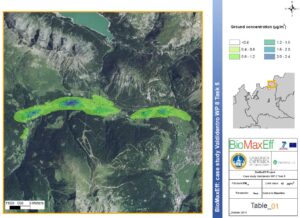Environmental impact assessment of biomass-fuelled boilers
The goal of the project is to develop low-power, biomass-fueled boilers that are highly efficient and have a very low environmental impact for low-consumption prefabricated buildings, making biofuels a clean energy from a climate change perspective, as they release into the environment only the amounts of carbon that plants have assimilated during their formation also with low environmental impact in terms of dust and nitrogen oxide emissions.
The Biomaxeff project, “Cost efficient biomass boiler systems with maximum annual efficiency and lowest emissions,” for the environmental impact assessment of new models of domestic pellet boilers, was funded by the European Union’s Seventh Framework Program for Research and Technological Development.
THE ROLE OF TERRARIA
TerrAria has been involved in assessing the impact of these technologies on a European scale in terms of both emissions and concentrations of air pollutants.



